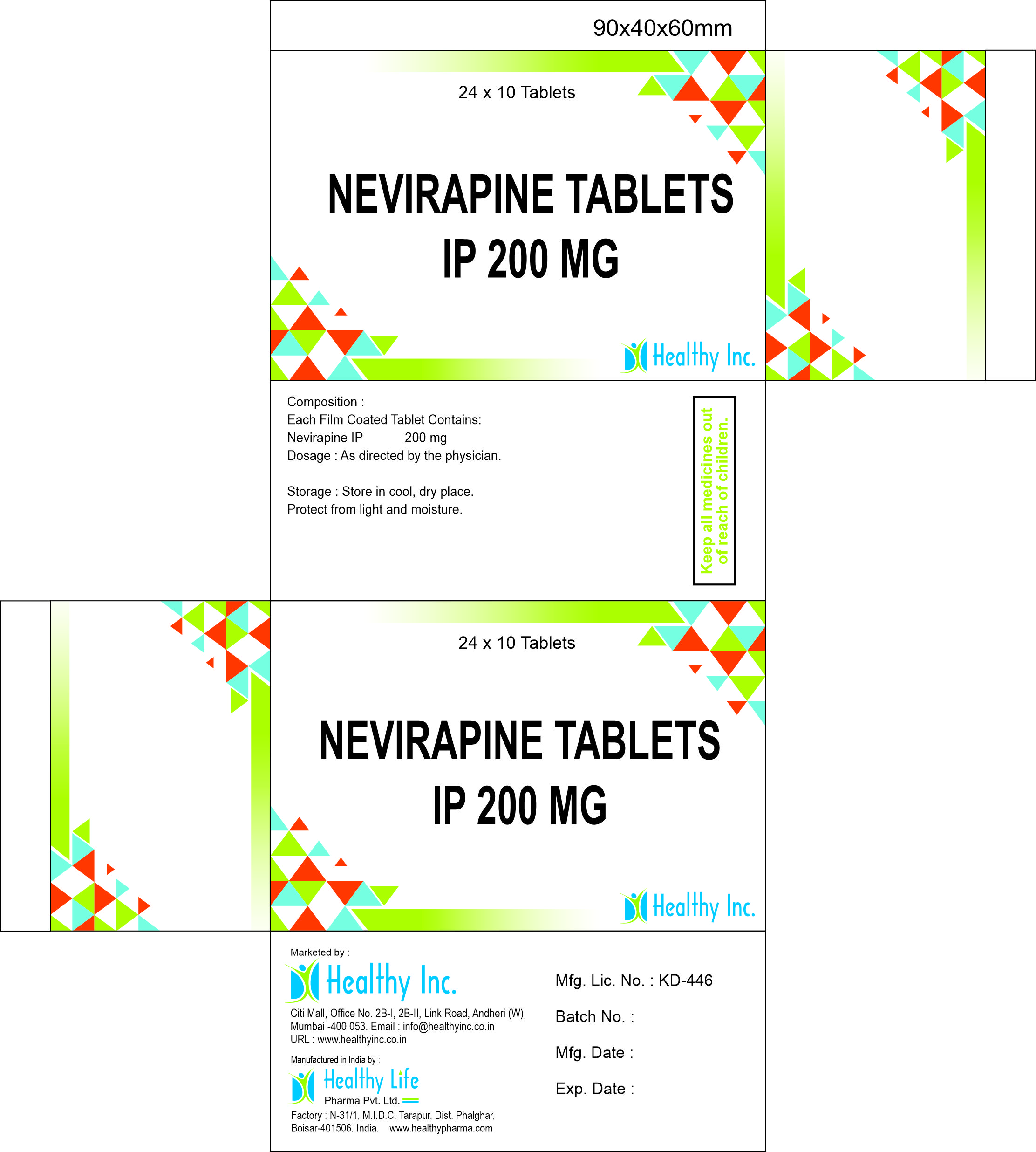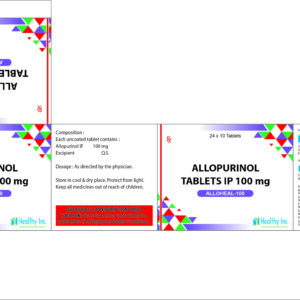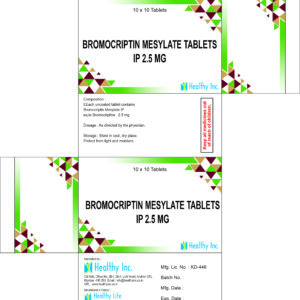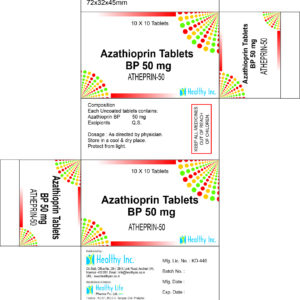Description
Product Description
Nevirapine tablets :
Healthy Incorporation and Healthy life pharma Pvt ltd are one of the leading manufacturer, supplier, and exporter of Nevirapine tablets 200mg,in India and serving the world with best quality pharmaceutical products.
Nevirapine tablets Manufacturer :
Healthy incorporation and Healthy life pharma Pvt ltd, is Mumbai Based WHO GMP certified manufacturer of injection, tablets, capsules, liquid, dry syrups, pre-filled syringes, ointments etc. with an extensive experience of over 45 years in manufacturing and have reach in many countries. We are committed to provide a stock of highly effective Nevirapine tablets to our innumerable clients with the help of our well-experienced pharmaceutical specialists.
Uses of Nevirapine tablets :
Nevirapine tablets is used in combination with other medications to cure human immunodeficiency virus (HIV) infection in children 15 days of age and older and adults. Nevirapine tablets belongs to group of drugs called as non-nucleoside reverse transcriptase inhibitors (NNRTIs). It works by reducing the amount of human immunodeficiency virus (HIV) in the blood. It is advisable to not share personal items like needles/syringes, toothbrushes, and razors that may have contacted blood or any body fluids with others.
This tablet is available only on doctor prescription.
Additional Information of Nevirapine tablets :
Product Name Nevirapine tablets
Composition & Active ingredients Nevirapine
Potency 200 mg
Therapeutic use HIV infections
Packing 10 Tablets (1 Box)
Dosage As per Doctor Prescription
Precautions of Nevirapine tablets :
Please inform doctor your medical history of any diabetes, heart problems, liver disease, kidney disease, lactose/galactose intolerance. Consult your doctor if you are pregnant or planning to get pregnant, or breast- feeding mother.
Side Effects of Nevirapine tablets :
Most of the time there is no serious side effects. Some common side effects may arise after starting medication, as your body adjust to medicine. If any of your symptoms worsen then consult your doctor immediately
Swelling of hands, feet,ankles,lower legs
Painful red bumps on the skin
Tiredness
Fever
Headache
Rash
Nausea
Insomnia
Dizziness
For Detailed Product Information Contact Us at +91 7710003340, If you need Any assistance in selecting our Products that fits your requirements. If you’re looking for any product that you’re not seeing here, please contact our support team.
Nevirapine tablets
Nevirapine is an antiretroviral medication used in the treatment of HIV (human immunodeficiency virus) infection. It belongs to a class of drugs known as non-nucleoside reverse transcriptase inhibitors (NNRTIs). Nevirapine works by inhibiting the replication of the virus in the body.
Here are some key points about Nevirapine tablets:
Indication: Nevirapine is primarily used to treat HIV-1 infection, either in combination with other antiretroviral drugs as part of antiretroviral therapy (ART) or for the prevention of mother-to-child transmission of HIV during childbirth.
Dosage: The dosage of Nevirapine can vary depending on the patient’s age, weight, and the specific regimen prescribed by a healthcare provider. It is typically taken orally as a tablet, and the dosing schedule should be followed as directed by a healthcare professional.
Side Effects: Like all medications, Nevirapine can have side effects. Common side effects include rash, nausea, headache, and fatigue. Some individuals may experience more severe reactions, so it’s essential to report any adverse effects to a healthcare provider.
Drug Interactions: Nevirapine may interact with other medications, so it’s important for healthcare providers to be aware of all drugs a patient is taking. Some drug interactions can reduce the effectiveness of Nevirapine or lead to adverse effects.
Pregnancy and Breastfeeding: Nevirapine is used in pregnant women to prevent mother-to-child transmission of HIV. It may also be used in breastfeeding women. However, the use of Nevirapine during pregnancy and breastfeeding should be closely monitored by a healthcare provider.
Resistance: As with all antiretroviral medications, the development of drug resistance is a concern. Patients should adhere to their prescribed dosing schedule to minimize the risk of developing resistance to Nevirapine.
Monitoring: Regular monitoring of HIV viral load and CD4 cell count is essential to assess the effectiveness of Nevirapine therapy and to adjust treatment as needed.
It’s crucial to note that Nevirapine should be used under the guidance and supervision of a qualified healthcare professional. They will determine the appropriate treatment regimen and monitor its effects to ensure the best possible outcomes for individuals living with HIV. Always consult with a healthcare provider for the most up-to-date information and guidance on the use of Nevirapine and other HIV medications.
Nevirapine is an antiretroviral medication used in the treatment of HIV (human immunodeficiency virus) infection. It is typically prescribed as part of a combination therapy known as highly active antiretroviral therapy (HAART) or antiretroviral therapy (ART) to manage HIV and slow down the progression of the disease.
Here are some key points about Nevirapine tablets:
Mechanism of Action: Nevirapine belongs to a class of antiretroviral drugs called non-nucleoside reverse transcriptase inhibitors (NNRTIs). It works by inhibiting the reverse transcriptase enzyme of HIV, which is essential for the virus to replicate within human cells.
Dosage: The specific dosage of Nevirapine can vary depending on a person’s age, weight, and the overall treatment plan. It is important to follow the prescribed dosage and schedule provided by a healthcare provider.
Side Effects: Nevirapine may cause various side effects, which can range from mild to severe. Common side effects include rash, nausea, fatigue, and liver problems. In some cases, it may cause a severe, life-threatening skin reaction called Stevens-Johnson syndrome. It’s important to report any side effects to a healthcare provider.
Drug Interactions: Nevirapine can interact with other medications, which may affect its effectiveness or lead to adverse reactions. It’s important to inform your healthcare provider about all the medications and supplements you are taking to avoid potential interactions.
Resistance: HIV can develop resistance to Nevirapine if it is not used in combination with other antiretroviral drugs. Resistance can make the medication less effective over time.
Pregnancy: Nevirapine can be used in pregnant individuals with HIV to reduce the risk of mother-to-child transmission. However, it’s crucial to consult with a healthcare provider, as there are specific guidelines for its use during pregnancy.
Hepatitis B: Nevirapine can also be used to treat chronic hepatitis B infection.
Please note that the information provided here is for general informational purposes. If you or someone you know is living with HIV and considering or currently taking Nevirapine, it’s essential to consult with a healthcare professional who can provide personalized guidance and monitor treatment progress. Additionally, the use of specific medications and treatment regimens may change over time, so it’s important to stay up-to-date with the latest medical recommendations.
Nevirapine is an antiretroviral medication used to treat HIV (human immunodeficiency virus) infection. It belongs to the class of drugs known as non-nucleoside reverse transcriptase inhibitors (NNRTIs). Nevirapine helps to slow the progression of HIV and reduce the viral load in the body by inhibiting the reverse transcriptase enzyme, which is necessary for the virus to replicate.
Nevirapine is often prescribed as part of a combination therapy, commonly referred to as highly active antiretroviral therapy (HAART) or antiretroviral therapy (ART). Combining different antiretroviral drugs in a treatment regimen is more effective in controlling the virus and delaying the development of AIDS (acquired immunodeficiency syndrome).
Nevirapine tablets are taken orally, and the dosing regimen typically depends on a patient’s specific condition and the other drugs they are taking. It is essential to follow your healthcare provider’s instructions regarding dosage and frequency. Additionally, like any medication, Nevirapine may have potential side effects and drug interactions, so it’s crucial to discuss these with your healthcare provider to ensure safe and effective treatment.
Nevirapine is an antiretroviral medication used in the treatment of HIV (human immunodeficiency virus) infection. It is primarily used as part of combination therapy to control and manage HIV. Nevirapine belongs to a class of drugs known as non-nucleoside reverse transcriptase inhibitors (NNRTIs), which work by interfering with the replication of the virus in the body.
Here are some key points about Nevirapine tablets:
HIV Treatment: Nevirapine is used as part of highly active antiretroviral therapy (HAART) to manage HIV. HAART involves combining multiple antiretroviral drugs to suppress the virus and slow the progression of the disease.
Prevention of Mother-to-Child Transmission: Nevirapine can also be used to prevent mother-to-child transmission of HIV during childbirth. It is administered to both the mother and the newborn to reduce the risk of transmission.
Dosage: The dosage of Nevirapine can vary depending on the specific treatment regimen and individual factors. It is typically taken orally in tablet form.
Side Effects: Like all medications, Nevirapine can have side effects. Common side effects include skin rash, liver problems, and gastrointestinal symptoms. Serious skin reactions and liver toxicity are rare but possible, so regular monitoring of liver function is important.
Drug Interactions: Nevirapine can interact with other medications, so it’s important to inform your healthcare provider about all the medications you are taking to avoid potential drug interactions.
Resistance: HIV can develop resistance to Nevirapine and other antiretroviral drugs if not taken as prescribed. This is why adherence to the treatment regimen is crucial.
Pregnancy and Breastfeeding: Nevirapine can be used during pregnancy and breastfeeding, but its use should be carefully monitored and managed by a healthcare professional to ensure the best outcomes for both the mother and the child.
Please note that medical information can change over time, and it’s essential to consult with a healthcare professional or physician for the most up-to-date and personalized information regarding your specific condition and treatment options.
Nevirapine is an antiretroviral medication used in the treatment of HIV (human immunodeficiency virus) infection. It belongs to a class of drugs known as non-nucleoside reverse transcriptase inhibitors (NNRTIs). Nevirapine is typically used as part of combination therapy, often referred to as antiretroviral therapy (ART) or highly active antiretroviral therapy (HAART), to manage and suppress HIV infection.
Here are some key points about Nevirapine tablets:
Purpose: Nevirapine is used to reduce the viral load and slow the progression of HIV infection. It does not cure HIV but helps control the virus, allowing the immune system to recover and reducing the risk of complications.
Dosage: The specific dosage and regimen of Nevirapine will depend on various factors, including the patient’s weight, age, and other medications they may be taking. It is important to follow the prescribed dosing schedule and instructions provided by a healthcare professional.
Side Effects: Common side effects of Nevirapine may include rash, nausea, headache, and liver abnormalities. More serious side effects can occur, so it’s important for individuals taking Nevirapine to be monitored regularly by their healthcare provider.
Drug Interactions: Nevirapine can interact with other medications, including some over-the-counter drugs and herbal supplements. It’s crucial for patients to inform their healthcare provider about all the medications they are taking to avoid potentially harmful interactions.
Resistance: As with all antiretroviral drugs, there is a risk of developing drug-resistant strains of HIV if Nevirapine is not taken as prescribed or if the virus mutates. Therefore, adherence to the prescribed treatment plan is essential.
Pregnancy: Nevirapine can be used during pregnancy to reduce the risk of mother-to-child transmission of HIV. However, its use during pregnancy should be carefully monitored by healthcare professionals.
Hepatic Monitoring: Patients taking Nevirapine should have their liver function regularly monitored, as the drug can cause liver-related side effects in some individuals.
Availability: Nevirapine is available in tablet form and may be prescribed as part of combination therapy with other antiretroviral drugs.
It’s important for individuals living with HIV to work closely with their healthcare provider to determine the most appropriate antiretroviral regimen, including whether Nevirapine is the right choice for their specific situation. Regular medical check-ups and adherence to the prescribed treatment plan are essential for the successful management of HIV.
Nevirapine is an antiretroviral medication used to treat HIV (human immunodeficiency virus) infection. It is a non-nucleoside reverse transcriptase inhibitor (NNRTI), which means it works by inhibiting the reverse transcriptase enzyme necessary for the virus to replicate within human cells.
Here are some key points about Nevirapine tablets:
HIV Treatment: Nevirapine is used in combination with other antiretroviral drugs to manage HIV infection. It’s not used as a monotherapy but rather as part of a highly active antiretroviral therapy (HAART) regimen.
Prevention of Mother-to-Child Transmission: Nevirapine can also be used to prevent the transmission of HIV from an HIV-positive mother to her child during childbirth.
Dosage: The dosage of Nevirapine can vary depending on the specific regimen and the patient’s weight and overall health. It’s usually taken orally in tablet form. Your healthcare provider will prescribe the appropriate dosage.
Side Effects: Like many medications, Nevirapine can cause side effects, which can range from mild to severe. Common side effects include rash, fever, nausea, and liver problems. Severe skin reactions, including Stevens-Johnson syndrome, are rare but can occur. It’s essential to report any side effects to your healthcare provider.
Resistance: As with other antiretroviral drugs, HIV can develop resistance to Nevirapine if not taken consistently and correctly. This is why adherence to the prescribed regimen is crucial.
Interactions: Nevirapine may interact with other medications, so it’s essential to inform your healthcare provider of all the drugs you’re taking, including over-the-counter and herbal supplements.
Pregnancy and Breastfeeding: The use of Nevirapine during pregnancy and breastfeeding should be carefully monitored and discussed with a healthcare provider. It is sometimes prescribed for pregnant women to prevent transmission to the baby.
It’s important to note that the field of HIV treatment and medications is continually evolving. Therefore, the specific guidelines and recommendations for the use of Nevirapine may change over time. It’s essential to consult with a healthcare provider or an infectious disease specialist who can provide the most up-to-date information and guidance on the use of Nevirapine and other antiretroviral drugs for HIV management.
Nevirapine is an antiretroviral medication used in the treatment of HIV (human immunodeficiency virus) infection. It is typically prescribed as part of combination therapy, often referred to as antiretroviral therapy (ART), to manage and suppress the virus in individuals living with HIV. The combination of different antiretroviral drugs helps to reduce the viral load, maintain a healthy immune system, and slow the progression of HIV to AIDS (acquired immunodeficiency syndrome).
Nevirapine is available in tablet form and is usually taken orally. It is part of a class of drugs known as non-nucleoside reverse transcriptase inhibitors (NNRTIs), which work by inhibiting the reverse transcriptase enzyme, essential for HIV replication.
It’s important to note that nevirapine, like many other antiretroviral drugs, can have side effects and may interact with other medications. The specific dosing and usage instructions for nevirapine tablets should be determined by a healthcare provider based on the individual’s medical history, overall health, and the presence of any other medical conditions.
It’s crucial for individuals taking nevirapine or any other HIV medications to adhere to their prescribed regimen, attend regular medical check-ups, and communicate with their healthcare team to ensure the most effective and safe management of their HIV infection.
Note: Healthy Incorporation and Healthy life pharma Pvt ltd tries to ensure that all information, whether in relation to the products, services, offerings provided as part of this website is correct at the time of inclusion on the website, Unauthorised use of any materials contained on this website may violate copyright laws, trademark laws, the laws of privacy and publicity, certain communications statutes and regulations and other applicable laws and regulations. Please connect with us to discuss precise product specifications and requirements and obtain advice on which products are suitable for your requirement or you can write to us
Nevirapine Tablets ,नेविरेपाइन गोलियाँ मि.ग्रा , comprimidos de nevirapina , comprimés de névirapine, قرص نيفيرابين ملغ , 奈韋拉平錠 毫克 , comprimidos de nevirapina , Невирапин Таблетки , ネビラピン錠, suppliers India, Exporters,Wholesalers India, Distributors India, Generic Supplier,who gmp certified manufacturer








